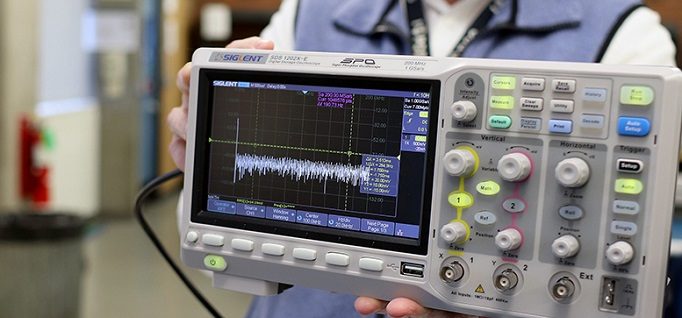Bringing the engineering classroom to students’ homes
By James Hill
April 28, 2021
Home kits keep classes going during the pandemic
Sometimes adversity breeds innovation.
That’s exactly what the Electronic Engineering Technology Program (EET) at Portland Community College (PCC) did in 2020 when classes were forced to go online as a result of the pandemic. As the entire college shifted learning to remote and online platforms, the program didn’t stay idle and hope its students would survive. Instead, faculty proactively secured more than $71,000 in Carl D. Perkins grant funding, which has helped purchase 110 home kits for students to do lab work and maintain hands-on skills.
Community colleges all over the country have tackled the pandemic with innovation and PCC is no exception. The kits include some of the program’s most-used equipment, like the oscilloscope, function generator and digital multimeters, as well as power supplies. Students were only required to buy small and inexpensive items, such as five-second timers, jumper wires, LEDs, resistors, capacitors and toggle buttons to continue their work and complement the kits.
“Our students have enjoyed working on their projects from home,” said EET faculty chair and project lead Sanda Williams, who added that the effort has opened the possibility of hybrid classes and online cohorts. “This increased their skills and confidence. We were able to buy test equipment for each student for this past winter term and plan to accommodate more students for spring and summer terms until we are back on the campus.”
Meeting a need
The home kit idea was the brainchild of Williams when her students started dropping classes as a result of PCC transitioning to online or remote classes. Despite some early doubts about whether such a project could work, students embraced the concept and used the equipment responsibly, as well as returned the kits when they were done.
The EET Program, based at the Sylvania Campus in Oregon, provides an important pipeline of workers for the local industry. Her program produces graduates for firms like Intel, Biotronik, OHSU, Sunset Solar and Cascade Microtech, to name a few. Many of PCC’s graduates have achieved upper-level positions as engineering managers and quality control technicians as result of the training.
One of the current students is Lina Ruvalcaba, who plans to work in the healthcare industry. She said it has been invaluable having the kits at home to continue her training and has allowed her to stay on the path toward earning an associate of applied science degree with a biomedical engineering technology option.
“During the last couple of terms, we have used a lot of new equipment and learned so much about the components and tools,” said Ruvalcaba, who works part-time to put herself through college. “Remote learning has been a challenge and a learning curve for all of us, but I appreciate that Portland Community College was able to find a way to make not ideal circumstances work out for their students. Even though working remotely has its challenges, it’s been great to have the instructors on your side and always making themselves available to meet after class to explain things. Being able to stay on track towards my degree has made a huge difference.”
Connected through technology
EET instructors were instrumental in developing new labs to be used with the take-home equipment, sharing their developments with other instructors and staff. The home kits have allowed students to receive hands-on laboratory experiences at homes. But they are never alone; Through Zoom meeting instruction and other electronic communications, instructors help students work through the lab experiments.
“The students learn more as they must struggle a bit on their own rather than having an instructor standing directly over their shoulder to provide immediate corrections,” said EET instructor Scott Williams. “The students feel a sense of accomplishment as they are able to see and measure the waveforms on the oscilloscope, which were predicted by their calculations.”
This article originally appeared in CC Daily.



